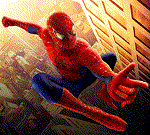The Fantastic Four is a fictional American team of comic-book superheroes in the Marvel Comics universe. First appearing in the historically groundbreaking The Fantastic Four #1 (Nov. 1961), which helped to usher a new naturalism in the medium, it was the first superhero team created by writer-editor Stan Lee and artist Jack Kirby.
The four core friends and family members that are traditionally associated with the Fantastic Four, and who gained superpowers after being exposed to cosmic rays during an outer space science mission are:
Mr. Fantastic (Reed Richards), the leader of the group, a scientific genius who can stretch his body into incredible lengths and shapes.
The Invisible Woman (Susan "Sue" Richards, born Storm; originally the Invisible Girl), Reed Richards' wife, the team's second-in-command. Beautiful and intelligent, Susan Storm can render herself invisible and project powerful force fields.
The Human Torch (Johnny Storm), Sue's brother, who can surround himself with flames, generate them as well, and fly.
The Thing (Ben Grimm), their grumpy friend with a heart of gold, who possesses superhuman strength and endurance, his skin is monstrous, craggy, orange, and looks as if made of scales or plates (often mistakenly referred to as "rocks"). Known for his great courage and fighting skill in addition to his strength, as evidenced by his battle against the Champion of the Universe.
In 2007, Mr. Fantastic and the Invisible Woman stepped down temporarily from active Fantastic Four duty and relinquished their spots to:
The Black Panther (T'Challa), reigning king of the African nation of Wakanda, who has superhumanly acute senses as well as his strength, speed, stamina, and agility at the peak of human development.
Storm (Ororo Munroe), T'Challa's queen, a former leader of the X-Men superhero team. Worshipped as a Goddess in Africa, she possesses the mutant power to control the weather.
Since the original four's 1961 introduction — in which the groundbreaking team did not even adhere to the convention of superhero costumes in its first two issues — the Fantastic Four have been portrayed as a somewhat dysfunctional yet loving family. Breaking convention with other comic-book archetypes of the time, its members would squabble and even hold animosities both deep and petty, and eschew anonymity or secret identities, and maintaining a celebrity status in the public eye.
The Fantastic Four formed the foundation of Marvel Comics' ascent from a small division of a privately held magazine company to a major entertainment conglomerate, and the team holds a pivotal place in the history of American comic books. The FF (as they are commonly known) has remained more or less popular since, and has been adapted into other media, including four animated television series, an aborted 1990s low-budget film, the major motion picture Fantastic Four (2005), and a sequel Fantastic Four: Rise of the Silver Surfer (2007).
The series, which famously added the hyperbolic tagline "The World's Greatest Comic Magazine!" above the title starting with issue #4 (issue #3 declared itself "The Greatest Comic Magazine in the World!"), dropped the "The" from the cover logo with #16, becoming simply Fantastic Four.
skip to main |
skip to sidebar

My Hero
Spiderman

My Hero
Blog Archive
-
▼
2007
(44)
-
▼
June
(15)
- Fantastic Four : Cast : Julian McMahon
- Fantastic Four : Cast : Doug Jones
- Fantastic Four : Cast : Michael Chiklis
- Fantastic Four : Cast : Chris Evans
- Fantastic Four : Cast : Jessica Alba
- Fantastic Four : Cast : Ioan Gruffudd
- Fantastic Four : Cast (Movie 2007)
- Fantastic Four plot summary (Movie 2007)
- Fantastic Four plot summary (Movie 2005)
- Fantastic four : history : John Byrne - 2
- Fantastic four : history : John Byrne
- Fantastic four : history
- Fantastic four : history : Lee and Kirby
- Fantastic four (Photo)
- Fantastic Four
-
▼
June
(15)
No comments:
Post a Comment